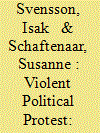|
|
|
Sort Order |
|
|
|
Items / Page
|
|
|
|
|
|
|
| Srl | Item |
| 1 |
ID:
156657


|
|
|
|
|
| Summary/Abstract |
Previous studies find a strong relationship between armed conflict and gender equality, but only compare armed conflict to no armed conflict onset. However, opposition movements use different means to challenge governments, such as nonviolent or armed strategies. This study explores this variation and poses the question: How does the level of gender equality affect the onset of nonviolent campaigns and armed conflicts? It makes two contributions. First, I quantitatively test the impact of gender equality on different forms of conflict onset, and second, I propose a comprehensive gendered mobilization argument based on strategic choice theory. Nonviolent campaigns rely on mass participation, and the nonviolent conflict literature claims that they are open to a wider array of participants, including women, compared to armed conflicts. I argue that gender norms affect movements’ expectations of mobilization (mass or limited) as well as conflict norms (nonviolent or violent) in society, and subsequently, the choice of conflict strategy. I hypothesize that higher levels of gender equality, measured by fertility rate and female-to-male primary school enrolment ratio, increase the likelihood of nonviolent campaign onset, compared to both armed and no campaign onset. This study analyses country-year data from the UCDP and NAVCO datasets between 1961 and 2006 and finds that increases in gender equality are, on average, associated with an increased likelihood of nonviolent conflict onset.
|
|
|
|
|
|
|
|
|
|
|
|
|
|
|
|
| 2 |
ID:
187394


|
|
|
|
|
| Summary/Abstract |
This article presents the Uppsala Conflict Data Program (UCDP) “Violent Political Protest” (VPP) data set: a new –standalone- category of organized violence, which complements, and is compatible with, UCDP’s three categories of organized violence: one-sided violence, non-state, and state-based conflict. It consists of violent political protests, with at least 25 casualties during a year, in which informally organized civilians challenge states over governmental or territorial issues. We describe the data collection process, and demonstrate the data’s use with empirical analyses. Violent political protest is present globally, but most prevalent in the Middle East and Africa, and increasingly common over time. Violent political protest frequently co-occurs with state-based conflicts, but rarely due to conflict escalation. We explore if this is due to shared contexts, and find that gender inequality increases the likelihood of VPP onset, similar to state-based conflicts. Finally, we identify avenues for future research, including using VPP to assist in a more precise and complete analysis of organized violence.
|
|
|
|
|
|
|
|
|
|
|
|
|
|
|
|
|
|
|
|
|